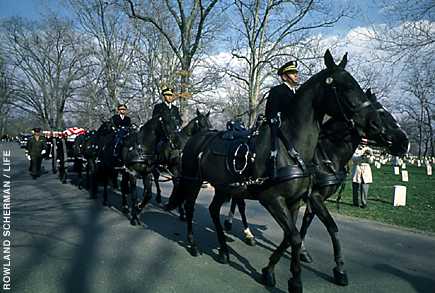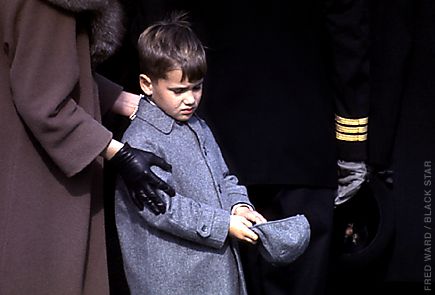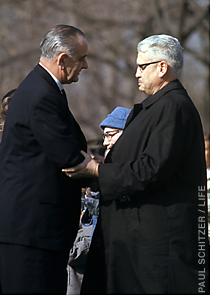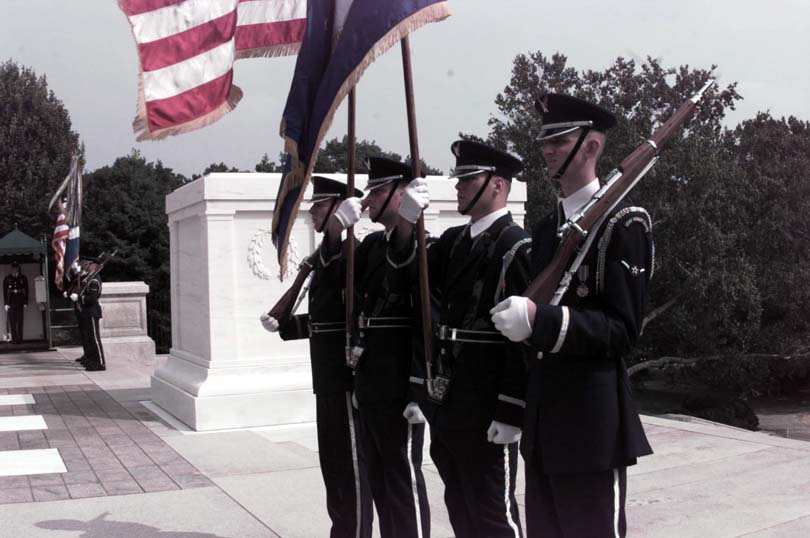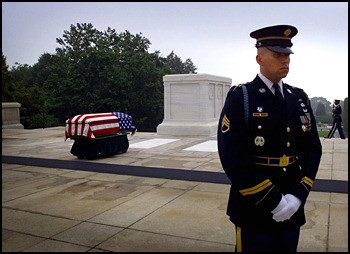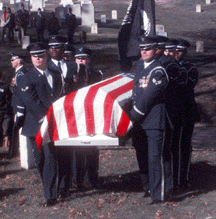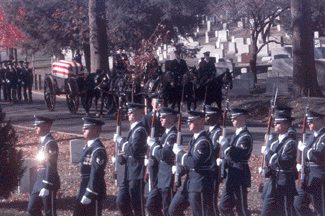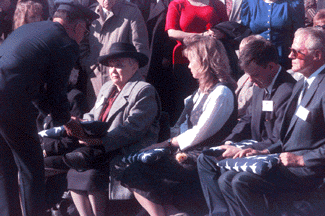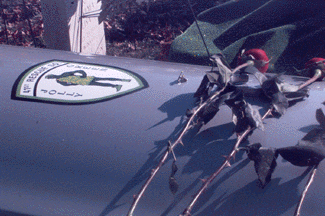-
AT ARLINGTON, THREE RIDERLESS HORSES
At Arlington the sound of hoofbeats and the creaking of caisson wheels, the folding of flags and the bugled Taps, all these familiar ingredients of a national mourning brought back memories still too fresh. Yet there were new elements, and these, too, were saddening. Standing at rigid attention at the burial service for Gus Grissom were his six fellow Mercury astronauts, and their stern and sorrow-lined faces, whose features have become so well and even joyfully recognized around the world, spoke not only of the somberness of the occasion but also of the passage of time. Now, after eight years of high accomplishment and repeated success, tragedy has removed one face from their proud ranks.
Six horses, three with saddles empty, draw Roger Chaffee’s coffin. At left is civilian Walter Cunningham (in Marine Reserve uniform), one of six “third-generation” astronauts in the cortege.
Comforted by his mother’s hand on his shoulder and by the nearness of his father’s old Navy friend, Gene Cernan, 5-year-old Stephen Chaffee struggles manfully for composure.
After burial service, President Johnson talks quietly with the astronaut’s parents, Mr. and Mrs. Donald Chafee of Grand Rapids, Mich.
An Air Force Color Guard detail posts the colors at the Tomb of the Unknowns at Arlington National Cemetery during an Air Force 50th Anniversary wreath-laying ceremony, 1998.
A member of the Third United States Infantry (“The Old Guard”)
protects the casket bearing the remains of the Vietnam Unknown shortly after the disinterment in May 1998.
Members of the U.S. Air Force Honor Guard carry the remains of one of six U.S. Air Force servicemen to his final resting place at Arlington National Cemetery. The six airmen, part of the famed Bat-21 rescue attempt in South Vietnam, were buried in the cemetery November 19, 1997. Twenty-five years ago, the airmen were performing a search-and-rescue mission over Quang Tri, when their Sikorsky HH-53 Helicopter — call sign Jolly Green 67 — was hit by enemy fire and crashed.
The repatriated remains of six airmen who were part of the famed Bat-21 rescue attempt in South Vietnam, were buried November 19, 1997 in Arlington National Cemetery. Capts. John H. Call III and Peter H. Chapman II, Tech. Sgts. James H. Alley, Allen J. Avery and Roy D. Prater, and Sgt. William R. Pearson were performing a search-and-rescue mission April 6, 1972, over Quang Tri, South Vietnam, when their Sikorsky HH-53 Helicopter — call sign Jolly Green 67 — was hit by enemy fire and crashed. The crew of Jolly Green 67 was part of an ultimately successful effort to rescue downed airmen Lt. Col. Iceal Hambleton and 1st Lt. Mark Clark.
Assistant Vice Chief of Staff Lt. Gen David L. Vesely, presents a flag to Greta Call, the mother of Capt. John H. Call III. Captain Call and five other airman lost their lives while flying in support of the famed Bat-21 rescue attempt in South Vietnam. The airman were buried Nov. 19 in Arlington National Cemetery. The six airmen were performing a search-and-rescue mission April 6, 1972, over Quang Tri, when their Sikorsky HH-53 Helicopter — call sign — Jolly Green 67 — was hit by enemy fire and crashed. The crew of Jolly Green 67 was part of an ultimately successful effort to rescue downed airmen Lt. Col. Iceal Hambleton and 1st Lt. Mark Clark
A pararescueman placed this Jolly Green sticker on the casket of one of the repatriated remains of the Jolly Green 67 crew that went down in the famed Bat-21 rescue attempt. The airmen were buried Nov. 19 in Arlington National Cemetery. Capts. John H. Call III and Peter H. Chapman II, Tech. Sgts. James H. Alley, Allen J. Avery and Roy D. Prater, and Sgt. William R. Pearson were performing a search-and-rescue mission April 6, 1972, over Quang Tri, when their Sikorsky HH-53 Helicopter — call sign Jolly Green 67 — was hit by enemy fire and crashed. The crew of Jolly Green 67 was part of an ultimately successful effort to rescue downed airmen Lt. Col. Iceal Hambleton and 1st Lt. Mark Clark.
Click Here For More Images Of Arlington National Cemetery
Click Here To Return To The Main Entrance
Michael Robert Patterson was born in Arlington and is the son of a former officer of the US Army. So it was no wonder that sooner or later his interests drew him to American history and especially to American military history. Many of his articles can be found on renowned portals like the New York Times, Washingtonpost or Wikipedia.
Reviewed by: Michael Howard

